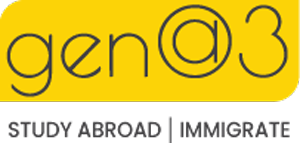
KEY FACTORS TO CONSIDER BEFORE TAKING THE LEAP
When investing a significant amount of money and time into an educational program, it is essential to consider various aspects to make the most out of your experience. The primary factor to consider is your background and how it aligns with your chosen field of study. Your educational program should aim to expand your knowledge and career base beyond your current expertise. Secondly, it is crucial to evaluate your passion for the subject and the potential career options that come with it. Many students select a program or career path based on the success of their peers or relatives. However, it is important to note that skill demand and technology are continually evolving, so it’s vital to choose a program that genuinely interests you.
It’s also important to research the education system of the country you plan to study in. Familiarize yourself with the curriculum, speak with current or past students, and understand the teaching methods. If the language of instruction is not your native language, it’s wise to learn the basics of the language to communicate with the locals and enhance your job prospects.
In summary, choosing the right educational program and studying abroad can be a life-changing decision. Thus, it’s crucial to evaluate all aspects, including your background, passion, education system, language, and career options, to make an informed decision that aligns with your long-term goals.
Why choose to study abroad?
Many individuals choose to study abroad due to various factors, such as cultural exposure, peer influence, or the allure of better prospects. Other advantages include access to quality coursework, exceptional faculty members, and the latest technological advancements. Additionally, students can gain practical experience through non-traditional learning methods and exposure to diverse projects offered by many foreign universities. Studying abroad also offers an opportunity to engage with individuals from different nationalities and cultures. This can broaden perspectives and understanding of the world.
Choosing a University
Before CHOOSING A UNIVERSITY it’s important to familiarize yourself with the education system’s unique structure of THAT COUNTRY. You can achieve this by reviewing the curriculum and speaking with current students in your program or alumni. For non-English speaking countries, it’s advisable to have a basic understanding of the language to facilitate communication with local residents and enhance your job prospects.
Getting a Job
When considering a course program, it’s crucial to assess the return on investment in terms of expenses incurred. It’s wise to choose programs that offer academic and professional growth, leading to a positive trajectory in your career GLOBALLY. Simply securing employment and a salary is not enough; it’s important to select a program that will enhance your resume and increase your value in the job market. To ensure you make an informed decision, connect with professionals in your field on professional platforms like LinkedIn. Seek out their opinions and experiences to gain insights that can aid in your decision-making process.
Location & Food
When considering job prospects, it’s important to think about location, but don’t let it overshadow the quality of coursework or university. Remember, you can always move to another LOCATION for work, so choose your university and program wisely. Keep in mind that higher job opportunities also mean higher competition, so make a smart decision.
Food is a valid concern for many students, especially for those who follow a vegan, vegetarian, or Jain diet. However, it’s worth noting that Indians have a strong presence in many countries around the world, including those with high education and job opportunities. There are often options available for vegans and vegetarians, and many cities in the USA have a significant number of Jains, so it’s possible to find roommates with similar dietary restrictions. While Jain food may not be readily available, some restaurants may be able to customize dishes upon request. Students with allergies, such as those to nuts and gluten, should make sure to communicate their needs to avoid potential issues. Additionally, if you want to bring homemade masalas or pickles, make sure they are well-packaged to prevent spills.
Documentation
Moving to a new country for pursuing higher education is an exciting experience, but it can also be a daunting one. With so many new experiences and challenges to face, it’s essential to be responsible, mature, and well-prepared.
One of the most crucial things to keep in mind while moving to a new country is to carry all the necessary documents with you. Your admit letter from the university, along with your passport, must be carried with you at all times until you settle down in the first few days. It’s also a good idea to carry Notary attested photocopies of these documents in case you lose the original ones.
Your university ID card will replace your passport or admit letter later on, so make sure you keep it safe. Additionally, carry photocopies of your academic documentation, such as transcripts and certificates, as they may come in handy when applying for internships or jobs.
Another essential document that you must keep safe is your bank details and documents. Make sure you store them in a location easily accessible only to you, such as a locker or a safe.
Apart from carrying documents, it’s also essential to be responsible and mature. Moving to a new country for higher education is often the first time that students live independently away from their families. Therefore, it’s crucial to take account of everything you do and remember to be safe than sorry.
One of the most important things to keep in mind while living independently is to never assume anything. It’s always better to research and be prepared for any situation than to be caught off guard. Before making any decisions, ensure that you have all the information you need and have considered all possible outcomes.
While moving to a new country, it’s also essential to be ready for the unexpected. Things may not always go according to plan, and it’s crucial to be flexible and adapt to changes. Try to keep an open mind and embrace new experiences, even if they are challenging.
In conclusion, moving to a new country for higher education can be an exciting experience, but it also comes with significant responsibilities. It’s essential to carry all necessary documents, be responsible and mature, and never assume anything. Remember to research, be prepared, and be ready for the unexpected, and you’ll be able to make the most of your new experiences and opportunities.
With over 18 years of industry experience, gen@3 is deeply committed to providing students with extensive guidance and support throughout their academic journey. Our team of highly experienced counsellors is devoted to assisting you in discovering the ideal program and university that aligns with your academic ambitions and career objectives.We offer end-to-end admission and immigration services, including country and program selection, exam training, application and documentation support, visa assistance (PR, spouse/children/visitor visas), scholarship and accommodation help, and pre/post-arrival aid. We ensure a hassle-free experience for our clients and guide them throughout the process.




